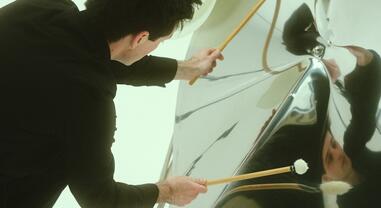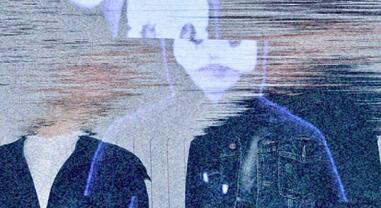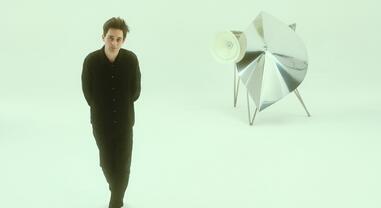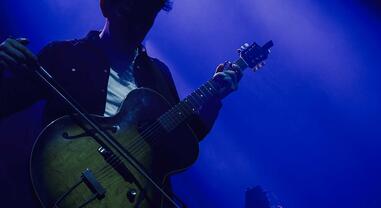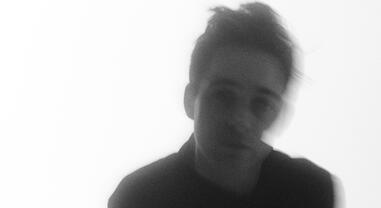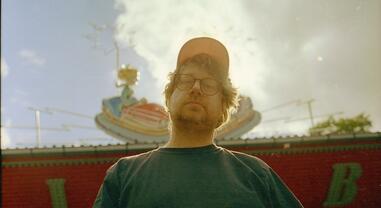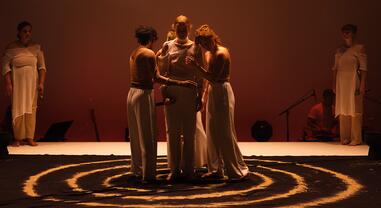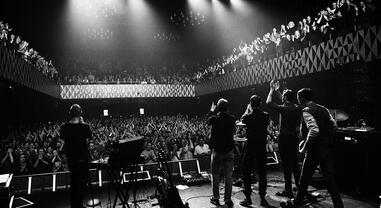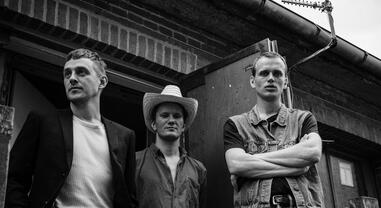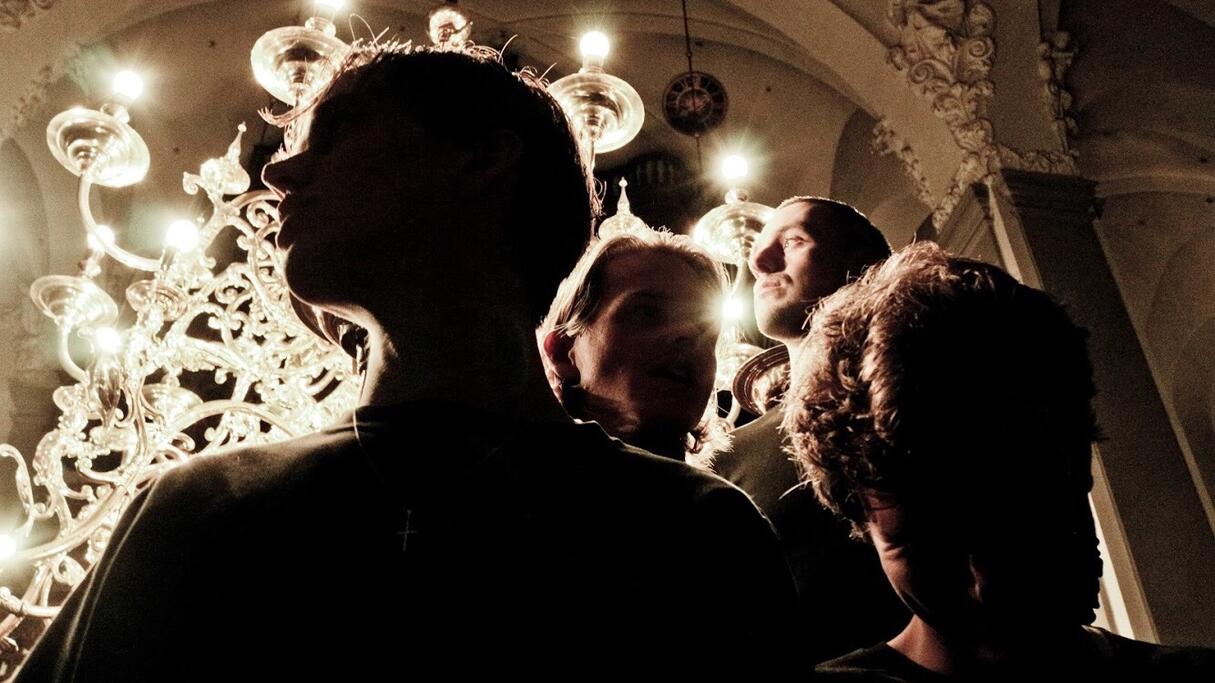
news
In-depth interview with Blaue Blume
Søren and Jonas of Blaue Blume sat down with Stockholm-based journalist Austin Maloney, talking about their way of making music, the earlier days and influences of the band, their new idea of song-writing as well as their brand-new album 'Bell Of Wool'. Have a good read!
To take it all back to the very beginning, tell me how the band got started back in Kolding, and what was the music scene like when you got started?
Jonas: The band started out back in our hometown Kolding in high school. But we never released anything, and so it didn’t really get started until we were based in Copenhagen. I can’t say there was a scene we were a part of, though a lot of our friends were messing with different projects and experiments and stuff. I think what drove us at that point was that we were friends, we were young, and excited about doing something together. We were the only ones we felt we connected with, we felt we had this special thing with the music we wanted to make. When we went into that room, it was just us.
Do you remember the first time you all played together?
Søren: Yes, it was ten years ago. The first formation of this band was just me and Jonas, and I think we played together for the first time during recess in high school. It wasn’t Blaue Blume then, it was just friends hanging out. The first time the Blaue Blume constellation came together was ten years ago, when Jonas and I had made some demos, and we couldn’t play them live on our own, we asked a good friend from the local music school, Peter, and my brother, Robert. I think everyone was very excited about it. We had sent the demos to the others, and they learned them. And I remember the experience, that we just went into the rehearsal space and counted the song off, and just played it. I really remember that, because I really felt it, and it instantly felt like this could be a band, even though we weren’t yet.
What kind of role does Kolding play in your lives now, when you all live in Copenhagen? You used to play there quite a lot.
Søren: I don’t feel connected to the music in Kolding.
Jonas: When we were growing up, there wasn’t really a music scene there. What made us different [from the rest of the scene], not that I’m trying to praise us, was that we had a desire to bring this band mentality, to be something bigger than just rehearsing. We had bigger goals. To actually make a living from this.
Søren: I remember Peter, who later joined us, was playing in another band at that time that had the same desire with their music we did, though they didn’t manage to stick together. But he was a kindred spirit, as he had tried to do the same thing we wanted. The four of us felt that way, and we were lucky enough to find each other.
What were the artists and influences that inspired you when you started out?
Jonas: Stuff like Jeff Buckley. He and his band had that same mentality. His approach to very dramatic music appealed to us, and resonated with the fact that we wanted music to be something bigger than just people playing together. And I feel that is still the essence of our group, it’s not just music, it’s also something sacred. His band was a big reference for us, regarding thinking about music in a bigger and more spiritual way.
Søren: I think we were also very inspired by that band musically, though that’s not so much the case anymore. But I’m still inspired by watching their live videos, or even interviews with them, that you really get the feeling that it’s just the four of them against the world. They’re a tight knit group, and they don’t care about, or seem to not care about, what people think of them. It’s between them, and that’s the important part. I loved that, and I wanted so much to be in a group like that. With people you love and want to hang out with and create with, and you don’t need and care about anyone else. It’s just you against the world.
When you started out, and the sound up as far as the first album, was quite indie-pop and jangle-pop in style. Then by the EP Sobs, you were moving in a more synth-pop direction. For this new LP, the sound is very subtle, almost soundscape music. So what was in your heads when you created the sound for this new record?
Jonas: It’s a process of taking a lot of early demo stuff, and taking a lot of fragments, and trying to place them together. It was that process that made the sonic universe.
Søren: We were coming from a place where we thought the only way to make music was to go into the rehearsal space, all four of us, and play together. So we could play and make the songs in that space, and it would be an almost finished product. Now we’ve moved on, and we’re much more a part of each other’s process in a way. A lot of stuff in this record has been, for example, us sitting in Robert’s apartment, and all of us working on his sound. He would play, and Jonas would direct what he heard, I would be tweaking some knobs and some friends not even in the band would chip in. We just talked about what we heard. From inside the band, it doesn’t feel like we’ve changed the way we make music. It’s still all of us together, trying to make something work. But I agree that it’s a new thing, and it wasn’t made the same way we made music before.
It kind of sounds like the biggest difference in the way it was made was that before you were all live-writing, you played together and wrote the songs in a rehearsal environment. And also before you had compartmentalised the various responsibilities in the band, Jonas takes care of the singing and so on. Now it sounds like those borders have broken down, and everyone has input on each other’s work?
Søren: Our lives have also changed. Back then we lived in a house together, and all we did was make music together. Now we don’t have as much time, so we want to make music a little faster, and that made us look for another way to make it work and still feel like us. I remember that for a couple of the songs, I would go back into old vocal recordings. Not even the demos, I would just open up the raw sessions files from the Sobs EP, open them up on my computer and try to make a new instrumental from it. So all of a sudden, I would have something that had already come from this band, already an inherent part of this band. So then I would send that to Jonas, and he would try to make something with it.
The songs are on the new album stick less to standard song-writing structures than your previous songs, they’re more abstract. Would you guys agree with that?
Jonas: It’s nice if you hear that, because it’s definitely something we’ve moving towards, trying to break from the traditional way of making a traditional pop song. We talked about this while making Bell Of Wool, we had this picture of a song consisting of just choruses, one chorus taking over from another with no repetitions, a smash hit with 30 different choruses in three minutes. We haven’t managed that yet, but things like that were in our mind when making the songs. We had the idea of strong sections of the song only occurring once – how would that make the listener feel? Would they want to return to the song? It was ideas of creating songs that flowed in a linear structure. It’s something we tried to achieve, and now we’re trying to perfect it even more.
Jonas, if I could ask you about the lyrics, do you find lyric-writing a release for you, or do you feel it’s a struggle?
Jonas: It’s definitely a struggle, really hard for me. Sometimes they come very quickly with the music, but they’re still always a hurdle for me. Language and lyrics always reduce something for me, that’s my first impression when I write lyrics. They always reduce the song to the picture the words draw. That for me is hard, it’s hard to find a picture written in language for something as abstract as music. So it’s a pain in the ass to write lyrics. I write a lot for other things outside the band and music, and there’s more freedom there. But the art of combining music and words, especially for our music which can go in many directions in its thought is tough. I feel I have a responsibility to not draw images that are too strong, so the listener can imagine their own worlds in the songs when they listen. Of course this record is full of images that only I know, but I try to keep the door open for the words to be forms and structures, that people can see whatever they feel in them. But it’s still a very personal record, and I think on this album I’ve come close to describing something very personal for me. And it may be personal for the listener as well, for their lives. So I think on this record I succeeded on that, in a way.
Can you go into more detail about the record’s title, Bell Of Wool?
Jonas: One more thing about my lyrical universe, it’s that it’s based on absurd phonetics in a way. I started writing songs in English because that’s what everyone was doing, but now as a songwriter, I hear myself speak another language when I sing in English. It’s more about how it sounds. And that is one of the reasons I ended up going with Bell Of Wool, because it has a rhythm to the words. It seems transparent in a way. I dreamt this title, and it’s not even a cliché, it actually happened. I actually woke up and wrote the title on a piece of paper. I remember seeing this bell in front of me, and seeing it ringing, but I wasn’t able to hear it. It was a very small image, but it was such a nightmare, because my idea of a bell was totally changed, because its function had been taken from it. So it made sense to make that a sticker for the record, and then we could make the music the ringing of the bell.
You guys go way back, and have these strong personal bonds.
Søren: Yes, the friendship comes before the band. We started playing music because we wanted to hang out with each other.
Jonas: A lot of stuff happened. We got kind of known in Denmark and Scandinavia, and then it turned a bit into something we did because we felt we had to. And I don’t know if you agree with me Søren and Buster, but I feel we were a bit lost in our goals, in a way. Now we’ve played a little gig in Hamburg, and being back in the rehearsal space, I find myself finding the right goals again. Which is being with these people I care about, who have been such a huge part of my whole life. And it’s so special to stand there and feel that symbiosis, and not even thinking about it having to have a commercial purpose. We’ve stopped thinking about having to play this stage, or having so many streams or whatever. Now it’s for our sake again. I was sure I was never going to play music again, something I’d done my whole life. When I felt this dark thing in me, and my body collapsed around it, I totally gave up on music. Of course, it grew naturally within me again, wanting to do music, and now I feel I’m doing it for the right reasons, with the right guys. Mentally, we’re back to where and why we started.
One of the things that struck me about a piece Søren wrote, was a line that stood out: “The thought came that there was not going to be any Blaue Blume soon, and that was a shit thought”. So how would you describe the feeling of being back?
Søren: Mainly it feels really good. One of the reasons for me personally, is that I always loved it. I always loved playing music and playing with these guys. It’s been a huge part of my life, and all of a sudden I thought this was maybe being taken away. So I’m happy to do this again, and as Jonas said, now, for the first time in a few years, it doesn’t feel like we’re doing it because of the next goal as a band. That’s just a nice addition to that.
Back to the record itself a bit. This album was more or less done two years ago, before Jonas got sick. How did it feel to return to it after that pause? Did you all find new meaning in these songs? And how much did you think about Bell Of Wool while the album was on pause?
Søren: I don’t think I thought that much about the record, because when Jonas got sick we were 90% done, or we thought we were, so that wasn’t something I thought a lot about, because I knew it we got together again we could finish it quick and it would be ready. So I was thinking a lot more about if we were going to get together again. The pause of working on the record was about six months I think. I think there were six months after Jonas got sick where we didn’t touch it. Then we slowly started to discuss it again, and talk about how we would finish it if we were going to finish it. Just getting into the mindset to finish it, once we were ready. So over the last year, we finished it, and a lot of that was just mixing.
Jonas: It’s funny how the songs really feels fresh to us, like we left something unanswered in every song. And there’s so much I can’t figure out. Especially from a personal point of view, because a lot of the lyrics kind of draw these states of mind and situations that I actually found myself in, just months after I had written them. So there’s so much unanswered. We tried to keep it fresh while mixing it as well. Tried to be impulsive about editing. If it felt good, it was good. The process of making the album was very spontaneous and fast, by our standards, so we wanted to keep that into editing. We didn’t know exactly what it was I felt like. When I heard it again, after coming back from a very dark place, I was immediately struck by the very explicit pictures I drew, that I could now relate to another way. But mostly I was left with a lot of unanswered questions. It’s different from anything else we’ve ever done, which has been very perfectionist. This is spontaneous, fresh.
Søren: I think for the first time, we’ve managed to do something that wasn’t thought-through to the end before we recorded it. We didn’t plan it out, and there wasn’t a blueprint. We’ve always been excessive demo-makers, to figure everything out before the final take. This time we recorded things just if they felt good, before it made sense, and that feeling stuck in the music. That’s why I think we can play it, a year and a half later, and it still feels surprising. That’s a strength for me, that I hope people will get.
Morgensol is the first song you’ve ever put out in Danish, as an official release. Was it the first track from this record as a symbol for a new dawn?
Jonas: It’s not a symbol in that way, though it kind of makes sense.
Søren: I think we thought the surprise element, and how it changed its sound at the end, that it was a good way of showing the album and its different faces. With this album, it was tough to pick a single, as it didn’t feel like any one song showcased the sound of the record. It’s so versatile in terms of sound and mood. I think Morgensol showcases a lot of the different sounds on this record, and it’s a good way in. And a lot of our friends who have listened to it say that it’s a record you need to listen to a couple of times. I don’t really agree, but if they’re right, I think it’s a good song to help people find a way in. And I believe if people get into the album, they will love it.
Jonas: I also think Morgensol sets the scene in a way, it forces people to listen and listen carefully. If people understand it, I think they will dive into the record and listen to it in a very open way, and not try and find the Sobs EP in this record. It sets the scene for a different record and a different sound for us.
Final question. When you did an interview with Luxembourg radio back in 2016, you said about the band’s purpose: “We strive for something that we cannot achieve, something only reachable in dreams, but it’s interesting to try in reality”. Would you say that statement still stands for what you’re trying to achieve with Blaue Blume?
Jonas: I don’t really think so any more actually. It’s always difficult to make a perfect song, and maybe it’s not possible. Maybe that song doesn’t exist in your head even. I’ve thought a lot about that whole way of thinking, and that quote is definitely something we’ve said to people. But it also compromises the work that we do, and I don’t think we should look down on that work. Real magic happens when thoughts and dreams meet the world, they are nothing on their own. I like the brutality of reality, it also shapes the beauty of our tracks. I wouldn’t say we strive to do something that is only within dreams. Music isn’t made in people’s heads, it’s also moving hands and vocal chords stretching and blood running. I think I’ve learnt that. I think it’s necessary for us to state that reality is very much present in our songs, and I think this album deals with the world as it is, as you can touch and feel it around you.
Søren: When you read it like that, it’s fun to hear, that it’s something we’ve said out loud, taking ourselves super seriously. It sounds very romantic, and like a bunch of guys that really like the idea of going into the dreamworld. I remember when I said those things, about trying to achieve things that can’t be achieved, that I hoped people would feel differently, that they would feel we managed it sometimes. To take something from that dreamworld and put it into reality. So you might say it was a way of saying we wanted to do something great. I wouldn’t say we’re trying to look in the dreamworld and put things into reality, you can’t do that. But we do strive to be better, and I think that quote is about that, in more romantic words.
